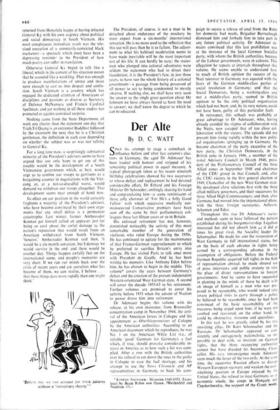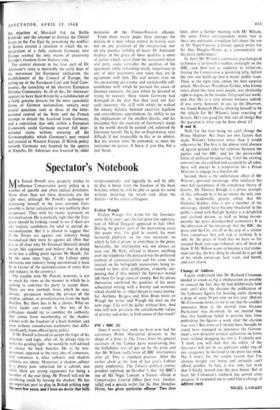Der Alte
By D. C. WATT
His enforced retirement has not, however, diminished noticeably the activity of this most remarkable member of the generation of vieillards who ruled Europe during the 1950s. He has continued to agitate for the maintenance of that Franco-German rapprochement to which he preferred to sacrifice Britain's entry into Europe. He has visited Paris to talk once more with President de Gaulle. And he has been writing his memoirs. Like Anthony Eden before him, he has chosen to begin in the middle. This volume* covers the years between Germany's defeat and the creation of the present independent Western-orientated West German state. A second will cover the decade 1953-63 to his retirement. Further volumes are promised to cover his activity before 1933 when the advent of Nazism to power drove him into retirement.
Dr Adenauer begins this volume with his release, at his own insistence, from Brauweiler concentration camp in November 1944. the arri- val of the American forces in Cologne and his appointment as Oherbfirgertneister of Cologne by the American authorities. According to an American document which he reproduces, he was No. I on the American White List (i.e., of reliable 'good' Germans for Germany), a fact which, if true, should provoke considerable in- terest in America as to how such a list was com- piled. After a row with the British authorities over his refusal to cut down the trees in the parks in Cologne to ease the fuel shortage, and his attempt to use the News Chronicle and AP representatives in Germany to back his cam- ' KONRAD ADENAUER: MEMOIRS 1945-1953. Trans- lated by Beate Ruhm von Oppen. (Weidenfeld and Nieolson. 63s.)
paign to secure a release of coal from the Ruhr for domestic fuel needs, Brigadier Barraclough dismissed him and forbade him to, take part in
any future political activity. Dr Adenauer re- mains convinced that this last prohibition was
at the instance of the local German Socialist party, with whom the British authorities, because of the Labour government, were in cahoots. This allegation he repeats at intervals throughout this
volume. He seems unable to understand how to much of British opinion the success of the
Nazi takeover in Germany was equated with the fears of the German middle-class parties of social revolution in Germany; and that the Social Democrats, being a working-class and not a middle-class party, seemed to British opinion to be the only political organisation which had not been, and, by its very nature, could not have been, guilty of this particular fault.
In retrospect, this setback was probably of great advantage to Dr Adenauer, who, having already avoided the stigma of collaboration with the Nazis, now escaped that of too close col- laboration with the victors. The episode did not prevent him rising rapidly within the new politi- cal organisations springing up in Germany. He became chairman of the party executive of the new party, the Christian Democrats, in the British zone in January 1946, a member of the zonal Advisory Council in March 1946, presi- dent of the Parliamentary Council of the three Allied zones in September 1948 and chairman of the CDU group in that Council, and, after the CDU victory in the first general election of 1949, Chancellor of the new West German state. He developed close relations first with the three allied military governors, and their successors the three Allied High Commissioners; and then, after Germany had moved into the international plane, with the three foreign secretaries, Acheson. Schuman and Eden.
Throughout this rise Dr Adenauer's tactics and methods seem to have followed the pattern established during his burgomastership. Legalism interested but did not absorb him ., it did at times his great rival, the Socialist leader Dr Schumacher. He made his aim the restoration of West Germany to full international status, but on the basis of each advance in rights being earned by a corresponding advance in the assumption of obligations. Before the Federal German Republic acquired full rights in the field of representation abroad, he made shrewd use of press interviews and public oratory to take the place of direct representations to foreign governments. And he seems to have succeeded in planting in the minds of those he dealt with an image of himself as a man who was pre- pared to be reasonable, who would indeed take severe political risks to carry through a policy he believed to be reasonable, once he had been convinced of the basic reasonability of the measures being urged upon him; if he were not soothed and reassured, -on the other hand, he could be obstructive. tiresome and querulous.
In this task he was greatly aided by his two unwitting allies. Dr Kurt Schumacher and the Russians. Dr Schumacher appeared so con- sistently and outrageously nationalistic. so possible to deal with. so insistent on German rights, that the three occupying authorities cannot but have dreaded his becoming Chan- cellor. His very intransigence made Adenauer seem much the lesser of the two evils. At the same time, the successive Russian efforts to disrupt Western European recovery and weaken the over- whelming position in Europe enjoyed by the United States, the refusal to treat Germany as at economic whole, the coups in Hungary and Czechoslovakia, the support of the Greek revolt. the rejection of Marshall Aid, the Berlin blockade and the attempt to distract the United States in the Far East by provoking the conflict in Korea created a situation in which the re- integration of a fully restored Germany into Europe seemed the only means of preserving Europe's freedom from Stalinist rule.
The central element in the later part of Dr Adenauer's story is inevitably the early days of the movement for European unification, the establishment of the Council of Europe, the setting-up of the European Coal and Steel Com- munity, the launching of the abortive European Defence Community. In all of this, Dr Adenauer appears to have been-driven by a combination of a fairly genuine distaste for the mere egocentric forms of German nationalism, anxiety over crucial questions such as those of the inter- national control of the Ruhr and the French attempt to detach the Saarland from Germany, and a conviction that only within a European framework could Germany recover full inter- national status without arousing all the Germanophobia which Germany's past record had created in Western Europe. If British policy towards Germany was haunted by the spectre of Rapallo, Dr .Adenauer was haunted by older
memories of the Franco-Russian alliance.
From these weary pages there emerges the picture of a man whose stature in history rests not on any grandeur of the imagination, nor on any peculiar nobility of heart. Dr Adenauer displays in the place of these qualities a sense of justice which, apart from the occasional mean and petty aside. concedes the qualities of his opponents while remaining totally impervious to any of their arguments save when they are in agreement with him. His real stature rests on the unswerving persistence and unshakeable self- confidence with which he pursued the cause of German recovery; the care which he devoted to trying to reassure those whom Germany had damaged in the past that they need not fear such recovery; the skill with which he walked the uneasy balance between excessive legalism and over-obvious opportunism; his ability to see the implications of the smallest details; and his insistence that the recovery of Germany's status in the world should be earned and achieved by Germany herself. He is, for an Englishman, very difficult if not impossible to like or to admire. But his stature must be conceded, as must his insistence on justice. A beast, if you like, but a just beast.



































 Previous page
Previous page